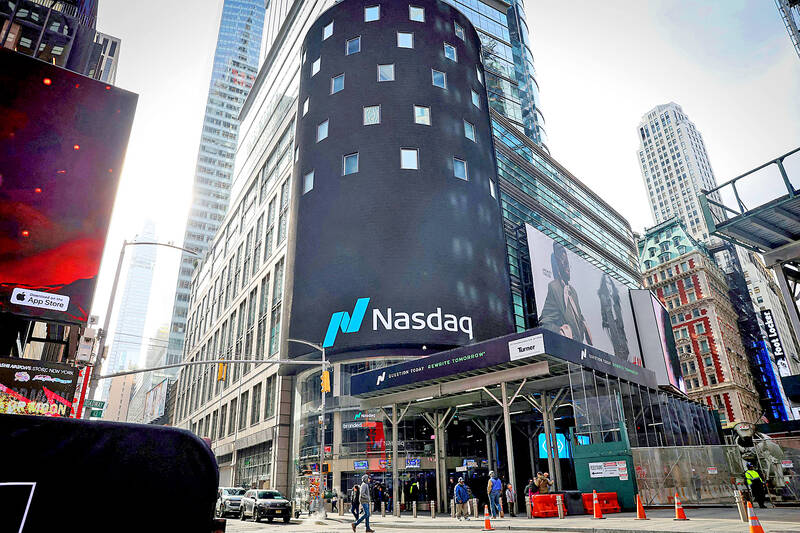NASDAQ Inc is once again increasing scrutiny of small initial public offerings (IPOs) from China and Hong Kong to avoid a repeat of the wild swings that followed a handful of deals two years ago, people familiar with the matter said.
Several Hong Kong and China-based IPO applicants have faced a series of questions from NASDAQ, the people said. Questions centered on the identity and independence of the firms’ pre-IPO investors selling shares, the people said.
A growing number of small firms from China and Hong Kong are turning to the NASDAQ to raise money, even as geopolitical tensions rise ahead of the US election. China has relaxed its grip on overseas listings, offering a lifeline to firms unable to tap funding at home amid a prolonged market slump. Hong Kong’s small-cap exchange was effectively closed for years until earlier this month, making NASDAQ an attractive alternative.

Photo: Reuters
The heightened grilling comes after several micro-cap stocks from China and Hong Kong, including AMTD Digital Inc (尚乘數科) and Addentax Group Corp (盈喜集團), surged as much as 32,000 percent in their 2022 trading debuts, only to crash in the ensuing weeks. That prompted a round of questioning in New York at the time.
No IPOs have so far been halted due to the heightened queries, but the process has been lengthened by weeks, adding uncertainty and costs to what is normally a quick review, the people said. They declined to name any of the companies facing scrutiny.
About 20 companies from China and Hong Kong have floated shares on NASDAQ this year, raising a combined US$195 million. Recent listings include Jiade Ltd (課標科技), a Chinese education software firm, and personal care company Raytech Holding Ltd (雷特控股). NIP Group Inc (星競威武集團), an e-sports company backed by a Hong Kong pop star, recently filed an IPO application.
Jiade is down 77 percent since listing last month and Raytech is down about 15 percent.
As part of the review, NASDAQ officials have asked about the backgrounds of the selling shareholders, their ties and history with the company and to each other. In some cases, NASDAQ required documentation to support the valuation of the private shares, as well as bank documents to prove money actually changed hands in the purchase, the people said.
These types of questions were rare in the past, despite long-standing rules governing selling shareholders, the people said. There has been a noticeable increase in companies registering their pre-IPO investors to fulfill the minimum public-float requirements.
Proving investor independence is essential to allay any suspicions of orchestrated pump-and-dump moves shortly after listing, the people said. The exchange is also seeking to ensure US-based investors make up the majority of these Asia-originated IPOs, the people said.
IPO hopefuls getting targeted inquiries are mostly those qualifying under the “equity standard” or “market value of listed securities standard,” the people said. The two streams — both requiring a minimum public float of US$15 million — are often preferred by smaller companies that cannot meet the net income standard of US$750,000 in annual profit in the past three years.Even so, the path is still easier than in Hong Kong.
“NASDAQ remains a desirable choice over Hong Kong for its low listing threshold, cost, time required and certainty from the disclosure-based system, despite recent scrutiny denting the edge a bit,” said Gordon Tsang (曾浩賢), a partner at Hong Kong-based law firm Stevenson, Wong & Co, who has advised about 10 NASDAQ deals.

Application-specific integrated circuit designer Faraday Technology Corp (智原) yesterday said that although revenue this quarter would decline 30 percent from last quarter, it retained its full-year forecast of revenue growth of 100 percent. The company attributed the quarterly drop to a slowdown in customers’ production of chips using Faraday’s advanced packaging technology. The company is still confident about its revenue growth this year, given its strong “design-win” — or the projects it won to help customers design their chips, Faraday president Steve Wang (王國雍) told an online earnings conference. “The design-win this year is better than we expected. We believe we will win

Intel Corp chief executive officer Lip-Bu Tan (陳立武) is expected to meet with Taiwanese suppliers next month in conjunction with the opening of the Computex Taipei trade show, supply chain sources said on Monday. The visit, the first for Tan to Taiwan since assuming his new post last month, would be aimed at enhancing Intel’s ties with suppliers in Taiwan as he attempts to help turn around the struggling US chipmaker, the sources said. Tan is to hold a banquet to celebrate Intel’s 40-year presence in Taiwan before Computex opens on May 20 and invite dozens of Taiwanese suppliers to exchange views

Chizuko Kimura has become the first female sushi chef in the world to win a Michelin star, fulfilling a promise she made to her dying husband to continue his legacy. The 54-year-old Japanese chef regained the Michelin star her late husband, Shunei Kimura, won three years ago for their Sushi Shunei restaurant in Paris. For Shunei Kimura, the star was a dream come true. However, the joy was short-lived. He died from cancer just three months later in June 2022. He was 65. The following year, the restaurant in the heart of Montmartre lost its star rating. Chizuko Kimura insisted that the new star is still down

While China’s leaders use their economic and political might to fight US President Donald Trump’s trade war “to the end,” its army of social media soldiers are embarking on a more humorous campaign online. Trump’s tariff blitz has seen Washington and Beijing impose eye-watering duties on imports from the other, fanning a standoff between the economic superpowers that has sparked global recession fears and sent markets into a tailspin. Trump says his policy is a response to years of being “ripped off” by other countries and aims to bring manufacturing to the US, forcing companies to employ US workers. However, China’s online warriors